Donald Trump mulls sending all who cross border illegally to Mexico

The plan is under consideration and no final decisions have been made.
Democrats prepare resolution against Donald Trump’s declaration
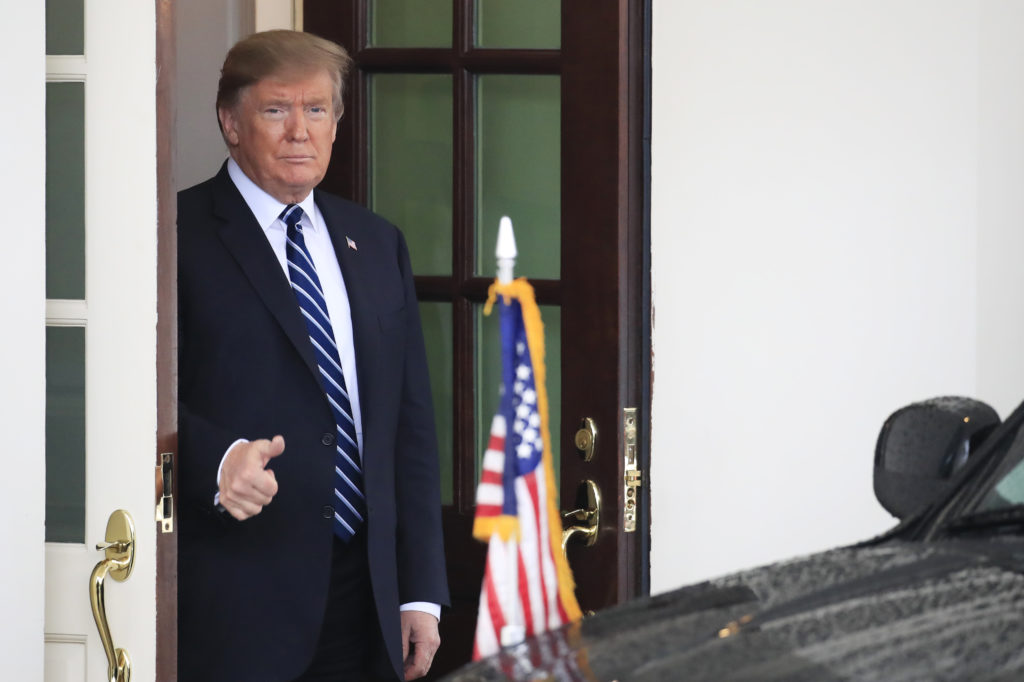
House Democrats will file a resolution Friday aimed at blocking the national emergency declaration that President Donald Trump has issued to help finance his wall along the Southwest border, teeing up a clash over billions of dollars, immigration policy and the Constitution’s separation of powers. Though the effort seems almost certain to ultimately fall short — perhaps to a Trump veto — the votes will let Democrats take a defiant stance against Trump that is sure to please liberal voters. They will also put some Republicans from swing districts and states in a difficult spot. Formally introducing the measure sets up a vote by the full House likely by mid-March, perhaps as soon as next week, because of a timeline spelled out by law. Initial passage by the Democratic-run House seems assured. The measure would then move to the Republican-controlled Senate, where there may be enough GOP defections for approval. The law that spells out the rules for emergency declarations seems to require the Senate to address the issue too, but there’s never been a congressional effort to block one and some procedural uncertainties remain. House Speaker Nancy Pelosi, D-Calif., seemed to predict approval, telling colleagues in a letter that her chamber will “move swiftly” to pass it and “the resolution will be referred to the Senate and then sent to the President’s desk.” Should the House and Senate initially approve the measure, Congress seems unlikely to muster the two-thirds majorities in each chamber that would be needed later to override a certain Trump veto. Even so, Republican senators facing tough 2020 re-election fights in competitive states like Arizona, Colorado and North Carolina would have to take stances that could risk dividing the GOP’s pro-Trump and more moderate voters. Moderate Sen. Susan Collins, R-Maine, said Wednesday she would back a resolution blocking the declaration, making her the first Republican to publicly state her support for the effort to thwart the emergency. With Republicans holding a 53-47 majority, three more GOP senators would need to vote with Democrats for the resolution to win initial approval. The votes could also cause discomfort for other Republicans who’ve opposed the declaration. Many have expressed concerns that Trump’s declaration sets a precedent for future Democratic presidents to declare emergencies to help their own favored issues, like global warming or gun control. The battle is over an emergency declaration Trump has issued to access billions of dollars beyond what Congress has authorized to start erecting border barriers. Building the wall was the most visible trademark of his presidential campaign. Congress approved a vast spending bill last week providing nearly $1.4 billion to build 55 miles of border barriers in Texas’ Rio Grande Valley while preventing a renewed government shutdown. That measure represented a rejection of Trump’s demand for $5.7 billion to construct more than 200 miles. Besides signing the bill, Trump also declared a national emergency and used other authorities that he says gives him access to an additional $6.6 billion for wall building. That money would be transferred from a federal asset forfeiture fund, Defense Department anti-drug efforts and a military construction fund. Federal officials have yet to identify specifically which projects would be affected. Pelosi and Rep. Joaquin Castro, D-Texas, circulated separate letters Wednesday to lawmakers seeking co-sponsors to his one-sentence resolution. A Castro aide said there were already 102 co-sponsors, all Democrats. Both letters targeted Friday for the measure’s introduction. While Congress is in recess this week, the House has a brief “pro forma” session Friday for bill introductions but no votes. Castro’s measure says Trump’s emergency declaration “is hereby terminated.” He chairs the 38-member Congressional Hispanic Caucus. “The President’s decision to go outside the bounds of the law to try to get what he failed to achieve in the constitutional legislative process violates the Constitution and must be terminated,” Pelosi wrote. Pelosi and Senate Minority Leader Chuck Schumer, D-N.Y., said in a joint statement last week that lawmakers will use “every remedy available” to defend Congress’ powers, including in the courts. Democratic aides said Wednesday that leaders were still deciding exactly what legal action to take, and when. Outside activists said they understood from conversations with congressional staff that Democrats were likely to file their own lawsuit, rather than simply joining other actions that 16 state attorneys general and liberal, environmental and other organizations have commenced separately. It remained unclear whether Democrats would wait for congressional action to play out before going to the courts. Speaking Tuesday about the attorneys general suit, Trump said he expected to do “very well” in the case and said he had an “absolute right” to make the declaration. Democrats and some Republicans say there is no emergency at the border. They say Trump is improperly declaring one to work around Congress’ rejection of the higher amounts. Once a resolution of disapproval is introduced, the national emergency law says it must be assigned to a committee, which has 15 calendar days to send it to the full chamber. The House parliamentarian has assigned Castro’s measure to the House Transportation and Infrastructure Committee. That chamber then has three calendar days to vote on it. The timing could be shortened, which is why a vote could occur more quickly. The same procedure is then repeated in the second chamber. The law requires those timetables unless either chamber votes to do otherwise. If McConnell tries using that provision to delay the vote on the resolution, the vote on slowing the measure will become the key showdown. A spokesman for McConnell declined to comment on what the leader will do. Republished with permission from the Associated Press.
Martha Roby: Border security is a priority for Alabamians

As a member of the House Appropriations Committee, one of my jobs is to work alongside my colleagues to see that the government is funded on time each year. It’s no secret that the process is far from perfect and Congress often falls short of executing this important responsibility in the way our founding fathers intended, but this year, I am glad to report that we have taken steps in the right direction. As you may know, current government funding expires on December 7, and as of now, we have already funded 75 percent of the government under regular order. We have done our job to fund our military and the Department of Veterans Affairs on time, and now it is imperative that we build upon this positive momentum by properly funding the rest, including the Department of Homeland Security, in order to crack down on our country’s illegal immigration problem. I’m sure you have seen the recent news reports about the caravan of individuals trying to force their way across our southern border. This situation is deeply troubling, and it is a direct threat to our national security. The unfortunate truth, however, is that this isn’t the first time something like this has occurred, and until we truly secure our border, it won’t be the last. Let me be clear: Our immigration system is broken, and it badly needs to be reformed. But, any real, meaningful discussions about reforms to the existing system absolutely must begin with securing the border. As I always say, if you have a leak in your house, you don’t replace the drywall until you fix the leak. In the same way, we cannot attempt to solve the larger problem with our immigration system until we stop the flow of illegal immigrants across our border. That’s why it is critical that Congress fully fund the Department of Homeland Security, which oversees border security and immigration, to provide the resources and tools necessary to secure the border, including President Trump’s request for a border wall. Last year, we put a down payment on construction of a wall along our southern border, and this year, it is our responsibility to direct additional funds towards this important measure and others. With my seat on the House Appropriations Committee, I’m in a strong position to ensure that many of our Alabama priorities are properly funded from year to year. Border security is one of those priorities, and I am eager to get this important work done. ••• Martha Roby represents Alabama’s Second Congressional District. She lives in Montgomery, Alabama, with her husband Riley and their two children.
Bradley Byrne: Illegal immigration is illegal

There are no two ways about it. Illegal immigration is illegal. The images of a caravan of illegal immigrants trying to push across our southern border is deeply troubling. We have laws in the United States for a reason. Everyone is bound by the rule of law, and we must all abide by the law to live in a civil society. There are ways to enter our country through clear, legal processes that have been in place for decades, used by those that show respect for our country. To this end, there are hundreds of thousands of people from all around the world who gain citizenship every year. According the Pew Research Center, around 19.8 million naturalized citizens currently live in the United States. We are a nation of immigrants and are proud of that fact. But, there are correct, legal ways to become a citizen in our country. Amassing thousands and marching on our southern border, or even just one person crossing the border illegally, is not the right way to gain citizenship. No one is more frustrated by illegal immigration than those who followed the law and proper process to enter our country the right way. I’ve heard from these legal immigrants at various public meetings over the years, and they are some of the most passionate about strong border security. Many see it as a matter of fairness. I visited Honduras and Guatemala at the beginning of October to learn more about what is driving much of the illegal immigration. It is true that there is much corruption, crime, and hardship in Central America. But, it cannot be stressed enough: illegal immigration is illegal. Also according to the Pew Research Center, roughly 11.3 million illegal immigrants currently live in the United States, roughly 3.5 percent of our total population. It remains clear that our immigration system is broken and has been for some time. After years of ineffective policy and Democrat obstruction, it is time we come to a solution that works for the American people. Any immigration reform effort must start with border security. That is why I introduced the 50 Votes for the Wall Act, which creates a pathway to build President Donald Trump’s border wall and help secure our southern border. The bill creates a new mandatory spending program, providing up to $25 billion, to fully fund President Trump’s border wall. The bill directs this money be used by the secretary of Homeland Security to construct physical barriers and associated detection technology, roads, and lighting along the southern border. We have passed bills funding the wall out of the House previously, only to see those bills stall out in the Senate, where 60 votes are needed to pass wall funding. That’s why my bill would use the reconciliation process to build the wall. Under the reconciliation process, only 50 votes are necessary for passage of bills. This would allow us to overcome Democrat obstruction and provide the critical money to the Trump Administration that they need to protect our borders. Not only would my bill fully fund the wall, but it would take the wall building program out of the appropriations process and prevent Democrats from bottling up funding in future years. It is critically important that we pass my bill, the 50 Votes for the Wall Act, by the end of the year in order to help protect the American people and finally secure our southern border. Border security is national security. We must secure our borders if we are to secure our future as a country. • • • Bradley Byrne is a member of U.S. Congress representing Alabama’s 1st Congressional District.
Donald Trump signs order denying asylum to illegal border crossers

President Donald Trump issued an order Friday to deny asylum to migrants who enter the country illegally, tightening the border as caravans of Central Americans slowly approach the United States. The plan was immediately challenged in court. Trump invoked the same powers he used last year to impose a travel ban that was upheld by the Supreme Court. The new regulations are intended to circumvent laws stating that anyone is eligible for asylum no matter how he or she enters the country. About 70,000 people per year who enter the country illegally claim asylum, officials said. “We need people in our country but they have to come in legally,” Trump said Friday as he departed for Paris. The American Civil Liberties Union and other legal groups swiftly sued in federal court in Northern California to block the regulations, arguing the measures were clearly illegal. “The president is simply trying to run roughshod over Congress’s decision to provide asylum to those in danger regardless of the manner of one’s entry,” said ACLU attorney Lee Gelernt. The litigation also seeks to put the rules on hold while the litigation progresses. It wasn’t clear whether the case would go before a judge before the rules go into effect Saturday. They would be in place for at least three months but could be extended, and don’t affect people already in the country. Trump’s announcement was the latest push to enforce a hard-line stance on immigration through regulatory changes and presidential orders, bypassing Congress, which has not passed any immigration law reform. But those efforts have been largely thwarted by legal challenges and, in the case of family separations this year, stymied by a global outcry that prompted Trump to retreat. Officials said the asylum law changes are meant to funnel migrants through official border crossings for speedy rulings instead of having them try to circumvent such crossings on the nearly 2,000-mile (3,200-kilometer) border. Border Patrol agents in Yuma said they arrested nearly 450 migrants in Western Arizona this week. But the busy ports of entry already have long lines and waits, forcing immigration officials to tell some migrants to turn around and come back to make their claims. Even despite that, illegal crossings are historically low. Backlogs have become especially bad in recent months at crossings in California, Arizona and Texas, with some people waiting five weeks to try to claim asylum at San Diego’s main crossing. “The arrival of large numbers … will contribute to the overloading of our immigration and asylum system and to the release of thousands … into the interior of the United States,” Trump said in the proclamation, calling it a crisis. Administration officials said those denied asylum under the proclamation may be eligible for similar forms of protection if they fear returning to their countries, though they would be subject to a tougher threshold. Those forms of protection include “withholding of removal” — which is similar to asylum, but doesn’t allow for green cards or bringing families — or protection under the United Nations Convention Against Torture. Homeland Security officials said they were adding staffing at the border crossings to manage the expected crush, but it’s not clear how migrants, specifically families, would be held as their cases are adjudicated. Family detention centers are largely at capacity. Trump has said he wanted to erect “tent cities,” but nothing has been funded or decided. The U.S. is also working with Mexico in an effort to send some migrants back across the border. Right now, laws allow only Mexican nationals to be swiftly returned and increasingly those claiming asylum are from Central America, not Mexico. Trump pushed immigration issues hard in the days leading up to Tuesday’s midterm elections, railing against the caravans that are still hundreds of miles from the border. He has made little mention of the issue since the election, but has sent troops to the border in response. As of Thursday, there were more than 5,600 U.S. troops deployed to the border mission, with about 550 actually working on the border in Texas. Trump also suggested he’d revoke the right to citizenship for babies born to non-U.S. citizens on American soil and erect massive “tent cities” to detain migrants. Those issues were not addressed by the regulations. But Trump insisted the citizenship issue would be pushed through. “We’re signing it. We’re doing it,” he said. The administration has long said immigration officials are drowning in asylum cases partly because people falsely claim asylum and then live in the U.S. with work permits. In 2017, the U.S. fielded more than 330,000 asylum claims, nearly double the number two years earlier and surpassing Germany as highest in the world. Migrants who cross illegally are generally arrested and often seek asylum or some other form of protection. Claims have spiked in recent years and the immigration court backlog has more than doubled to 1.1 million cases in about two years, Syracuse University’s Transactional Records Access Clearinghouse reported this week. Generally, only about 20 percent of applicants are approved. It’s unclear how many people en route to the U.S. will even make it to the border. Roughly 5,000 migrants — more than 1,700 under the age of 18 — sheltered in a Mexico City sports complex decided to depart Friday for the northern city of Tijuana, opting for the longer but likely safer route to the U.S. border. Similar caravans have gathered regularly over the years and have generally dwindled by the time they reach the southern border, particularly to Tijuana. Most have passed largely unnoticed. Republished with permission from the Associated Press.
Donald Trump says border troops defending southern border could hit 15K
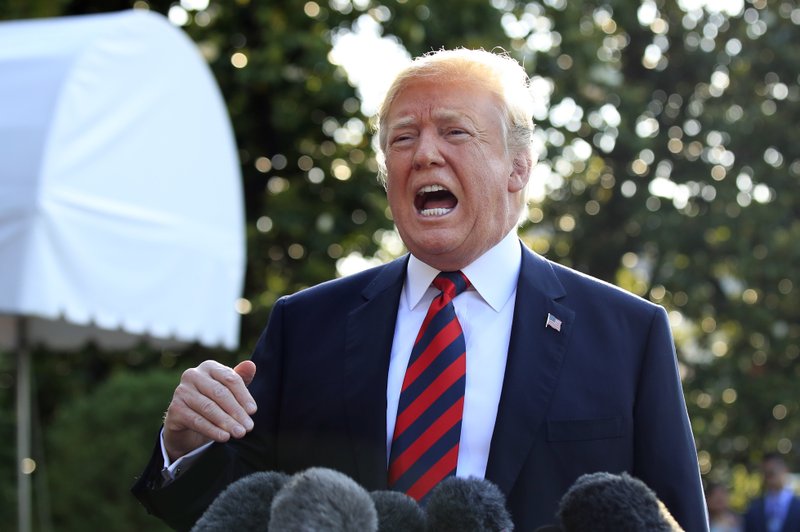
President Donald Trump says the number of military troops deployed to the U.S.-Mexican border could reach 15,000 — roughly double the number the Pentagon said it currently plans for a mission whose dimensions are shifting daily. The Pentagon says “more than 7,000” troops were being sent to the southwest border to support the Customs and Border Protection agents. Officials said that number could reach a maximum of about 8,000 under present plans. The troop numbers have been changing at a dizzying pace, with Trump drawing a hard line on immigration in the lead-up to the midterm elections. Just last week officials were indicating that about 800 to 1,000 might be sent. On Monday, officials announced that about 5,200 were being deployed. The next day, the Air Force general running the operation said more than the initially announced total were going, and he pointedly rejected a news report that it could reach 14,000, saying that was “not consistent with what’s actually being planned.” Gen. Terrence O’Shaughnessy, the commander of U.S. Northern Command, told reporters the number would exceed the initial contingent of 5,200, but he offered no estimate of the eventual total. Just 24 hours later, Trump thrust new uncertainty into the picture, catching the Pentagon by surprise. With his eyes squarely on Tuesday’s contests, Trump has rushed a series of immigration declarations, promises and actions as he tries to mobilize supporters to retain Republican control of Congress. His own Republican campaign in 2016 concentrated on border fears, and that’s his focus in the final week of the midterm fight. “As far as the caravan is concerned, our military is out,” Trump said. “We have about 5,800. We’ll go up to anywhere between 10,000 and 15,000 military personnel on top of Border Patrol, ICE and everybody else at the border.” Later Wednesday, Trump told ABC News, “We have to have a wall of people.” His comments were the latest twist in a story that has pushed the Pentagon unhappily into the political space, prompting questions about whether Defense Secretary Jim Mattis was allowing the military to be leveraged as a political stunt. “We don’t do stunts,” Mattis said Wednesday. Trump rejected the idea he was “fearmongering” or using the issue for political purposes, but his escalating rhetoric in the waning days of the campaign season calls that denial into question. Trump has railed against illegal immigration, including several caravans of migrants from Central America slowly moving on foot toward the U.S. border. The caravan of an estimated 4,000 people is still nearly 1,000 miles (1,600 kilometers) from the border. Several smaller groups, estimated at a combined 1,200 people, are farther away. As he seeks to stoke concerns about illegal immigration ahead of the midterm elections, Trump tweeted a video alleging Democrats were responsible for allowing a homicidal immigrant into the U.S. He provided no evidence supporting that claim. It was reminiscent of the infamous “Willie Horton” ad used against Democratic presidential candidate Michael Dukakis in 1988 and condemned as racist. Horton, who was black, raped a woman while out of prison on a weekend furlough. As Massachusetts governor, Dukakis supported the furlough program. Dukakis went on to lose to Republican George H.W. Bush. In his Wednesday tweet, Trump highlighted the case of Luis Bracamontes, a twice-deported immigrant from Mexico sentenced to death in California for killing two police officers. The 53-second spot includes expletives uttered by Bracamontes during his trial as he professed regret at not killing more officials. “Illegal immigrant, Luis Bracamontes, killed our people!,” the video states, adding, “Democrats let him into our country…Democrats let him stay.” It includes scenes of a migrant “caravan” moving toward the U.S., warning ominously, “Who else would Democrats let in?” Trump has insisted the media is underestimating the caravans. “You have caravans coming up that look a lot larger than it’s reported actually. I’m pretty good at estimating crowd size. And I’ll tell you they look a lot bigger than people would think,” he told ABC. He has also promised to end so-called catch-and-release policies by erecting tent cities to hold those crossing illegally. And this week he is asserting he could act by executive order to unilaterally end birthright citizenship for the children of non-U.S. citizens. Trump’s comments left some in the Pentagon scratching their heads. Officials said they had no plans to deploy as many as 15,000 troops. The number conceivably could reach 10,000, counting the 2,100 National Guard soldiers who have been operating along the border for months as part of a separate but related mission. The number of active-duty troops tapped for deployment stood at 7,000 as of Wednesday but could reach 8,000. A deployment of 15,000 would bring the military commitment on the border to roughly the same level as in war-torn Afghanistan. And it would more than double the number of people thought to be in the caravans. Trump did not back down Wednesday from his proposal to upend the very concept of American citizenship. In a morning tweet, he said the right to citizenship for babies born to noncitizens on American soil “will be ended one way or the other.” He also claimed that what he terms “so-called Birthright Citizenship” is “not covered by the 14th Amendment.” However, the text of the amendment’s opening Citizenship Clause is this: “All persons born or naturalized in the United States and subject to the jurisdiction thereof, are citizens of the United States and of the State wherein they reside.” The citizenship proposal would inevitably spark a long-shot legal battle over whether the president can alter the long-accepted understanding that the 14th Amendment grants citizenship to any child born on U.S. soil, regardless of his parents’ immigration status. House Speaker Paul Ryan asserted Tuesday that “obviously” Trump could not upend that policy by executive order, drawing a tweeted rebuke from Trump. He said Wednesday that Ryan “should be focusing on holding the Majority rather than giving his opinions on Birthright Citizenship, something he knows nothing about!” Speaking to reporters
Donald Trump revives fiery immigration talk for ‘caravan’ election
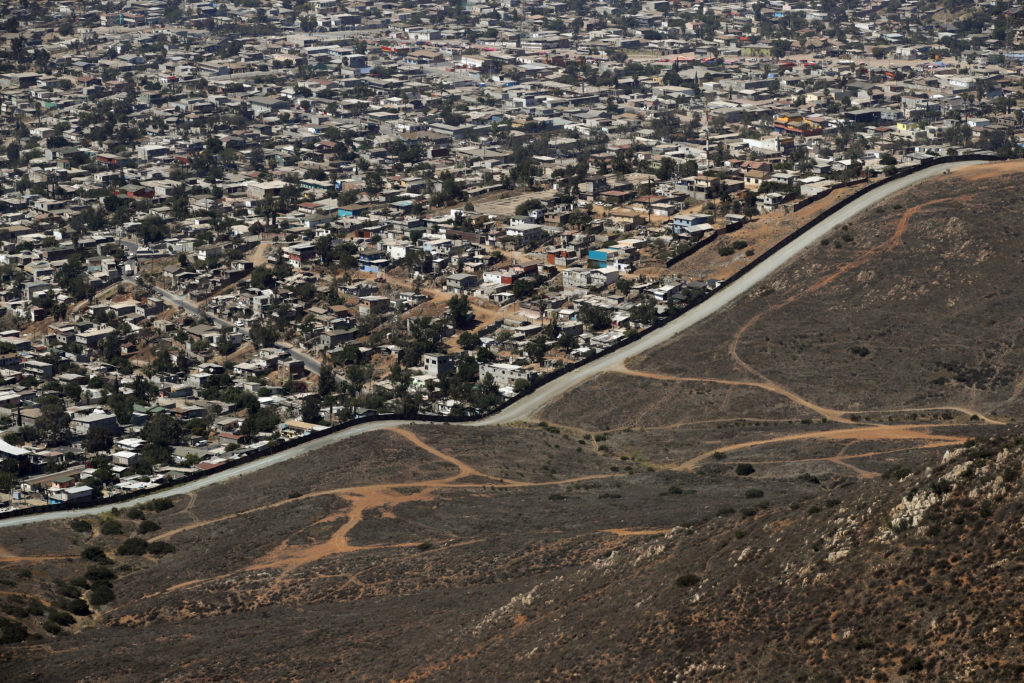
Donald Trump fueled his 2016 campaign with fiery immigration rhetoric, visions of hordes flowing across the border to assault Americans and steal their jobs. Now, in the final weeks before midterm elections, he’s back at it as he looks to stave off Democratic gains in Congress. It’s an approach that offers both risks and rewards. He could energize Democratic foes as well as the Republicans he wants to rouse to the polls. But for the president, the potential gains clearly win out. In campaign stops and on Twitter in recent days, he has seized on a huge caravan of Central American migrants trying to reach the United States through Mexico as fresh evidence that his tough immigration prescriptions are needed. He tweeted that the caravan was an “assault on our country at our Southern Border.” Then, Thursday night in Montana, he told cheering supporters, “This will be an election of Kavanaugh, the caravan, law and order and common sense. … Remember it’s gonna be an election of the caravan.” His assertions got a visual boost Friday when some members of the caravan broke through a Guatemalan border barrier with Mexico. A few then got through to Mexican territory, but most were repelled by police with riot shields and pepper spray. On an aggressive campaign blitz, Trump has sought to cast the midterms as a referendum on his presidency, believing that he must insert himself into the national conversation in order to bring Republicans out to vote. Perhaps no issue was more identified with his last campaign than immigration, particularly his much-vaunted — and still-unfulfilled — promise to quickly build a U.S.-Mexico border wall. To Trump, his pledges are still rallying cries. “I think it’s a big contrast point. All the Democrats are refusing to build the wall. It’s a good contrast,” said former Trump campaign aide Barry Bennett, who said the caravan was “perfectly timed” for Trump’s midterm pitch. But some warn that as Trump seeks to pump up his base, he could energize opposition. Matt Barreto, co-founder of the research firm Latino Decision, said an elevated immigration message could hurt Trump, too. “I think you run the risk of angering minority voters across the board, Latino, black and Asian-Americans and also alienating and distancing from whites, including conservatives and moderates, now that they see what’s happening with the family separations,” said Barreto, a professor at the University of California, Los Angeles. Thursday night, the migrant caravan of at least 3,000, many waving Honduran flags and chanting slogans, arrived at the Guatemalan border with Mexico. On Friday, they broke down Guatemalan gates and streamed toward a bridge to Mexico. Most were repelled by Mexican police, but about 50 got through. Mexico’s dispatching of additional police to its southern border seemed to please Trump. On Thursday night, he retweeted a BuzzFeed journalist’s tweet of a video clip showing the police deployment, adding his own comment: “Thank you Mexico, we look forward to working with you!” Earlier in the day, Trump railed against the caravan on Twitter and declared it was “Democrats fault for weak laws!” He also threatened to deploy the military to the border if Mexico did not stop the migrants and appeared to threaten a revamped trade deal with Canada and Mexico. Until days ago, immigration appeared to be unlikely to repeat its central role of 2016, as Trump heeded congressional Republican requests to avoid a government shutdown over funding for the border wall ahead of the midterms. And an internal GOP poll presented to the White House last month found that other issues — particularly opposing the “Medicare for All” policy of some Democrats — would better resonate with voters. While Trump did focus for a time on some Democrats calling for the abolition of the Immigration and Customs Enforcement agency, he largely discussed it as a warning against Democratic control of Washington. But the renewed embrace of the polarizing issue reflects a consensus view in both parties that control of Congress will be determined more by turning-out party loyalists than winning over centrist voters. A vigorous immigration push will likely be well-received in many of the deep-red areas where Trump is campaigning, like his stop in Montana Thursday night. Republicans acknowledge it could play differently in other parts of the country — and might even harm GOP candidates in some selected districts — but they are wagering that as in 2016 it is still a net-win issue for the president’s party. Trump campaigns Friday night in Arizona, an increasingly competitive state where the message could have a mixed result. He won Arizona by 3.5 percentage points two years ago, compared with Republican Mitt Romney’s 9-point margin in 2012. Ahead of the midterms, polls continue to show that voters consider immigration among the most important issues, though generally falling behind the economy and health care. However, Republican and Democratic voters have distinctly different views of immigration as a problem facing the country. A recent Pew Research Center survey found a majority of Democratic voters — 57 percent — think the treatment of immigrants in the country illegally is a very big problem in the U.S., compared with just 15 percent of Republican voters who say the same. By contrast, three-quarters of Republican voters call illegal immigration a very big problem, ranking the highest for Republicans among the long list on Pew’s survey, while just 19 percent of Democratic voters say the same. Recently, surveys from CNN and The Washington Post/ABC News found voters were slightly more likely to think the Democratic Party would do a better job handling immigration than the Republican Party. Republished with permission from the Associated Press.
ICE arrest of approximately 30 illegal immigrants in N. Alabama sparks conversation
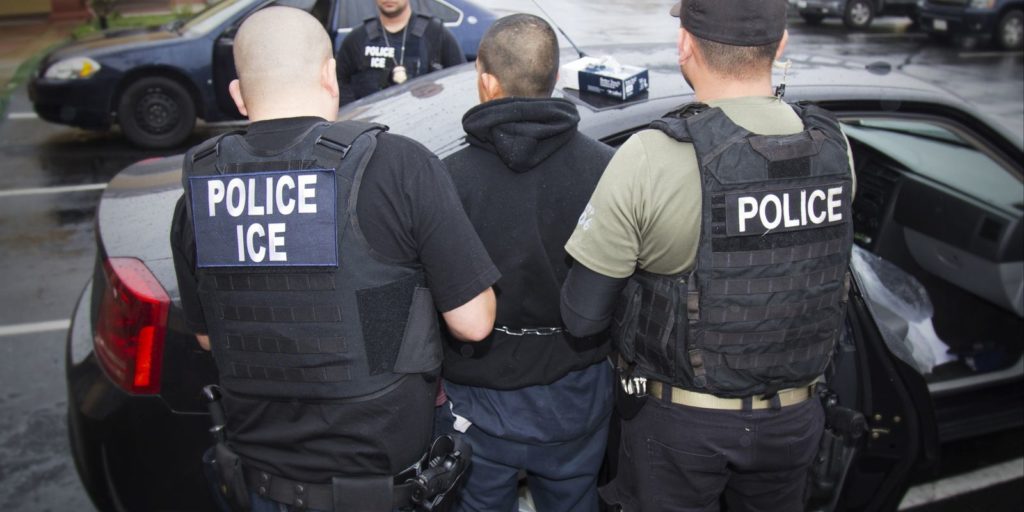
Agents from the U.S. Immigration and Custom Enforcement (ICE) arrested “approximately 30 persons” in North Alabama the last week of August, an ICE spokesperson has confirmed to Alabama Today. “ICE makes targeted arrests on a daily basis in accordance with its ongoing enforcement activity,” explained Bryan Cox, the Southern Region Communications Director for ICE. “The general premise I’ve seen from some in the area that ICE’s presence in North Alabama is a new development is not accurate. These arrests were made by Alabama-based officers regularly assigned to the area who conduct targeted enforcement actions as part of their everyday duties.” According to the ICE spokesman, the local field office, which is based in Louisiana and covers a territory spanning Alabama, Arkansas, Louisiana, Mississippi and Tennessee, is averaging, thus far this year, approximately 200 arrests in any given week. A local immigrants rights group is calling the arrests held a press conference in Huntsville, Ala. on Thursday titled “Stop Tearing Families Apart,” where they voiced their concerns over the recent arrests. The Alabama Coalition for Immigrant Justice (ACIJ) claims many of the people arrested did not have criminal records. They said they’ve collected information that ICE arrested people from Huntsville, Decatur, Athens, Hartselle, many whom of were simply getting ready for work or pumping gas. “We are for sure clear this is a racial profiling issue,” said ACIJ Executive Director Sarai Portillo. But ICE says that’s not the case. “ICE continues to focus its limited resources first and foremost on those who pose the greatest threat to public safety and any suggestions as to ICE engaging in random or indiscriminate enforcement are categorically false,” explained Cox. “ICE does not conduct any type of indiscriminate raids or sweeps that target aliens indiscriminately. The agency’s arrest stats clearly reflect this reality.” Nationally, 90 percent of all foreign nationals arrested by ICE to date in FY18 either had a criminal conviction, faced a criminal charge, or were already subject to a final order of removal. In explaining the reasons in which someone facing deportation may not have a criminal conviction or a pending criminal charge though they have been arrested for or suspected of criminal activity ICE noted that decisions of criminal prosecution is up to local prosecutors who when faced with a criminal facing imminent deportation may drop charges in order to allow ICE to expedite the deportation process thus saving the costs associated with incarceration and of trial. This decision to drop charges by the prosecutor, in which ICE has no say, allows for what some have called the manipulative ability of lawyers and family members of those being deported to claim that their family member has no record and thus pose no threat. The term “criminal alien” below signifies that an alien has been convicted of a an additional crime in the U.S. beyond their violation of federal immigration law. Sixty-one percent of the non-criminal aliens ICE has arrested in FY18 thus far nevertheless came to ICE’s attention due to criminal charges. New Orleans (of which Alabama is a part) field office ICE administrative arrest stats: FY18 (Q1-Q3): 7,584 arrests, 4,478 convicted criminal (59 percent) FY17: 7,968 arrests, 5,059 convicted criminal (64 percent) FY16: 5,174 arrests, 4,347 criminal (84 percent) FY15: 5,244 arrests, 4,385 criminal (84 percent) FY14: 7,429 arrests, 5,504 criminal (74 percent) FY13: 9,115 arrests, 6,370 criminal (70 percent) ICE national administrative arrest stats: FY18 (Q1-Q3): 119,884 arrests, 79,644 convicted criminal (66 percent) FY17: 143,470 arrests, 105,736 convicted criminal (74 percent) FY16: 110,104 arrests, 94,751 criminal (86 percent) FY15: 119,772 arrests, 101,880 criminal (85 percent) FY14: 183,703 arrests, 134,734 criminal (73 percent) FY13: 232,287 arrests, 168,444 criminal (73 percent) Watch the ACIJ press conference below:
Trump administration moves to detain migrant families longer
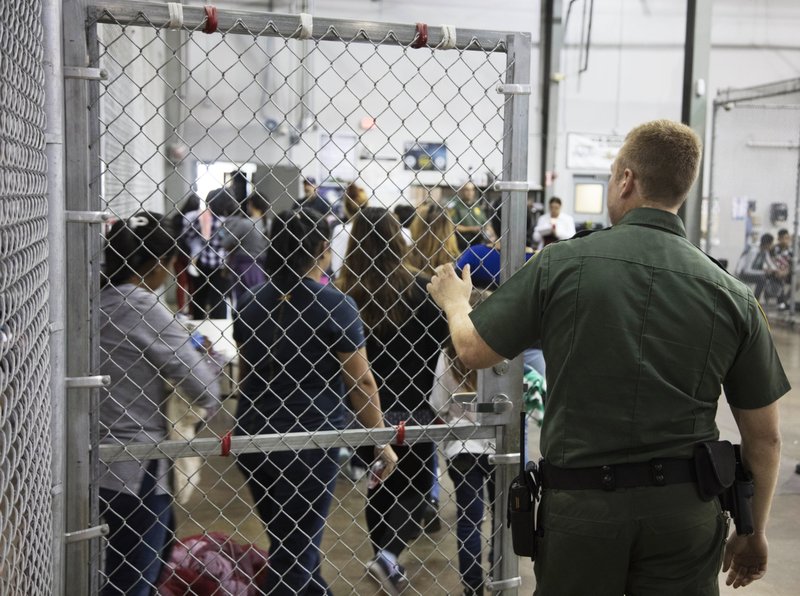
The Trump administration on Thursday moved to abandon a longstanding court settlement that limits how long immigrant children can be kept locked up, proposing new regulations that would allow the government to detain families until their immigration cases are decided. Homeland Security officials said that ending the so-called Flores agreement of 1997 will speed up the handling of asylum requests while also deterring people from illegally crossing the Mexican border. The move angered immigrant rights advocates and is all but certain to trigger a court battle. “It is sickening to see the United States government looking for ways to jail more children for longer,” said Omar Jadwat, director of the ACLU’s Immigrants’ Rights Project. “And it’s yet another example of the Trump administration’s hostility toward immigrants resulting in a policy incompatible with the most basic human values.” Vehicles leave the Port Isabel Detention Center, June 26, 2018, which holds detainees of the U.S. Immigration and Customs Enforcement in Los Fresnos, Texas. [Photo Credit: AP Photo/David J. Phillip, file] The Flores agreement requires the government to keep children in the least restrictive setting possible and to release them generally after 20 days in detention. For decades, because of those restrictions, many parents and children caught trying to slip into the country have been released into the U.S. while their asylum requests wind their way through the courts — a practice President Donald Trump has decried as “catch-and-release.” Such cases can drag on for years, and some immigrants stop showing up to court when it becomes clear their asylum requests are going to be denied. The newly proposed rules would allow the government to hold families in detention until their cases are completed. Homeland Security did not say how long it expects families to be kept locked up. But immigration officials say asylum cases involving detained families move much more quickly, taking months instead of years to resolve, in part because there are none of the delays that result when immigrants set free in the U.S. fail to show up for a hearing. “Today, legal loopholes significantly hinder the department’s ability to appropriately detain and promptly remove family units that have no legal basis to remain in the country,” said Homeland Security Secretary Kirstjen Nielsen. “This rule addresses one of the primary pull factors for illegal immigration and allows the federal government to enforce immigration laws as passed by Congress.” Earlier this summer, a federal judge in California rejected a request by the administration to modify Flores to allow for longer family detention. Administration officials say they have the authority to terminate the agreement, but that is likely to be tested in court. “They’re essentially trying to accomplish through regulation what the court has not permitted,” said Peter Schey, an attorney representing immigrant children under the settlement and president of the Center for Human Rights and Constitutional Law. Schey said he will oppose any effort to end Flores unless the government proposes acceptable regulations for the safe and humane treatment of youngsters. “Refugee children should not be made to suffer inhumane treatment and prolonged and unnecessary detention just to satisfy President Trump’s zero-tolerance approach to refugees seeking safety in the United States from the violence and lawlessness spreading throughout Central America,” Schey said. The Flores agreement became an issue last spring when the Trump administration adopted a policy of prosecuting anyone caught crossing illegally. More than 2,900 children were separated from their parents, prompting international outrage. Trump eventually backed down and stopped the separation of families. A federal judge ordered parents and children reunited; the government has said it has done so in as many cases as it could. But hundreds of parents were deported without their children, while others had criminal records or were not parents as they claimed to be, officials said. Because under Flores children cannot be kept in criminal custody with their parents or held for an extended period in immigration detention, the administration has limited options when dealing with families. The government operates three family detention centers that can hold a total of about 3,000 people, and they are at or near capacity. Homeland Security and the Pentagon have been working to line up as many as 12,000 beds for family members at Fort Bliss in El Paso, Texas. Another request for up to 20,000 beds for youngsters who arrive without parents is also pending. The ACLU’s Jadwat accused the administration of “trying to expand the trauma it is inflicting on these children in order to deter other people from coming to the country.” Rachel Prandini, staff attorney at the Immigrant Legal Resource Center, said the erosion of Flores’ protections would subject children to worsening conditions. “The Trump administration’s decision to exacerbate the suffering of kids, by imposing the cruel policy of family separation earlier this summer and now with this rule change to vastly expand detention of children, is horrifying,” she said. The regulations will be published in the Federal Register and will be subject to a 60-day public comment period starting Friday. Republished with the permission of the Associated Press.
Pure hypocrisy: How progressives respond to gun crimes vs. illegal immigrant crime

Today another family mourns a senseless act of violence. The search for Mollie Tibbetts the 20-year-old college student whose disappearance has captivated the nation since July 18 after when she vanished going on her daily jog has come to a heartbreaking end. Cristhian Bahena Rivera, an illegal alien from Mexico, who was questioned by authorities after being caught on video following her in his car has led authorities to her body and confessed to her murder. Within moments of the news breaking that Rivera was an illegal immigrant advocates of secure borders began pointing to the case as another example of why tougher border security is needed. The White House tweeted a statement by President Donald Trump about it. He then retweeted it. The loss of Mollie Tibbetts is a devastating reminder that we must urgently fix our broken immigration laws. pic.twitter.com/0Kaz0FQw36 — The White House (@WhiteHouse) August 22, 2018 Let me be clear, in case you don’t already know my position: I believe we need increased border security and we need to enforce the laws we have by deporting those in the country illegally. We should not reward those who have jumped ahead of those attempting to enter our nation legally by granting blanket amnesty to them or their children. We need comprehensive immigration reform for guest workers and we need to empower immigration officials to do more not less to protect legal citizens. We cannot afford to turn a blind eye to this growing problem. Illegal aliens are not all bad but they also aren’t all valedictorians. We need a clear and consistent way to address illegal aliens understanding that most if not all will have a personal story that will touch your heart and that that story isn’t enough for us to disregard our immigration laws altogether. Back to today’s arguments: The jump from the crime at hand to the policy implications of border control that happen whenever an illegal is involved in a high profile case is as tasteless to me as when gun control groups seize upon gun crimes to push their agenda. I’m not sure what an appropriate length of time is to address the issue but within minutes seems cold on both accounts. That said there is a blatant hypocrisy in the way that people from the left and right react to crime and the criminals who commit them. With nearly every high profile gun crime comes immediate calls for gun control but in the case of acts of violence by illegal immigrants those very same people shout that an entire group shouldn’t be persecuted for the acts of one or a few. Which is it? Can one act or one person define an entire population? (The answer being no of course.) We need to address both issues gun crime and illegal immigration on their own. The questions we should be asking for gun crime isn’t how to add regulations it’s actually the same one we should be asking about immigration: How do we enforce the laws we have? How do we identify and stop those who are at the highest risk for committing crimes? How do we make our nation safer? It is through rational policy debate not emotionally charged finger pointing that we will solve our toughest problems. Let me bottom line it for you: If you think we need to regulate guns every time there’s a gun crime but call foul when people point to closing the borders when illegal aliens commit crimes you might be hypocrite but in both cases you’re not making us any closer to solving the problem either. We can do better and we should for the victims of all crime.
Steve Marshall talks illegal immigration, drug trafficking at White House event
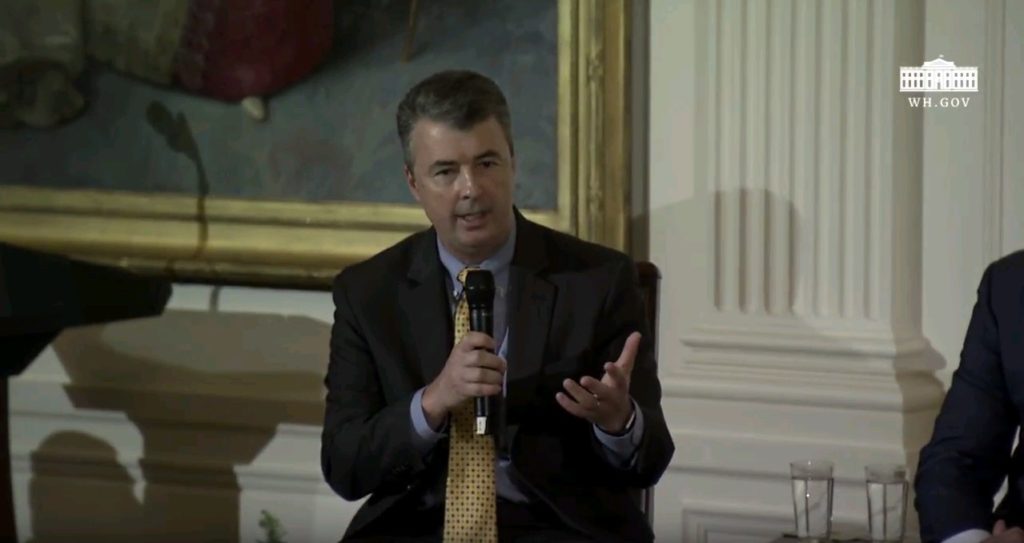
Concerned with border security and the crime associated with cross-border drug trafficking and illegal immigration, Alabama Attorney General Steve Marshall accepted an invitation to the White House to participate in a panel discussion on Monday about cooperation between federal, state, and local government in protecting national borders. Chaired by Mercy Schlapp, Assistant to the President and Senior Advisor for Strategic Communications, the panel consisted of Marshall, along with CBP Commissioner Kevin McAleenan, ICE Deputy Director Ron Vitiello, U.S. Senator David Perdue (R-GA), Governor Doug Ducey (R-AZ), and Cochise County, Arizona, Sheriff Mark J. Dannels in a discussion in the East Room of the White House. “Due to our state’s proximity to Atlanta, a major distribution point for drugs, and to Texas, a border state, Alabama has become a prime transit point for drug trafficking,” said Marshall. “We see marijuana, cocaine, meth, and now illicit fentanyl coming into our state as a result. The drug trade brings dangerous and violent illegal aliens into Alabama. Just this summer, our state was rocked by the brutal murder of a special needs 13-year-old girl—killed by affiliates of the Mexican drug cartel. I am grateful to the President and the White House for allowing me to share the observations of Alabama law enforcement and our citizens.” The day also featured an immigration a ceremony with President Donald Trump‘s that honored the men and women of Immigration and Customs Enforcement (ICE) and Customs and Border Protection (CBP). There, agents, ho have been caught in the crosshairs of the immigration policy debate as they uphold their sworn duty to enforce the law, were brought to the podium to note their achievements in addressing unlawful border crossings and stemming the flow of illicit drugs. “As the chief law enforcement officer of the State of Alabama, I want to thank each member of ICE and CBP for your courage and your loyalty to enforcing the laws of this country in the face of irresponsible rhetoric and meritless attacks,” added Marshall. “The people of Alabama thank you, too. The work of ICE and CBP has a direct connection to the safety of the citizenry that extends far beyond those states that are on the border.” Marshall continued, “A shared mission and strong partnership between state and local law enforcement and the brave agents of ICE and CBP are in the best interest of public safety and I am pleased with the coordination that I see in Alabama. But in the immigration debate, public safety is not the only threat we must contend with. The rule of law—America’s bedrock principle—is under attack as well.” Marshall singled out Trump and former Alabama U.S. Senator, U.S. Attorney General Jeff Sessions for their strong support of border security. “Under the previous administration, amnesty programs were unconstitutionally initiated by executive fiat and without any action from Congress. The former United States Attorney General turned a blind eye to sanctuary cities that brazenly refused to work with ICE and CBP,” said Marshall. “The Justice Department also failed to cooperate with Congress when Border Patrol Agent Brian Terry was killed in relation to a botched gunwalking operation. Thanks to the leadership of President Trump, Attorney General Sessions, and Secretary [Kristjen] Nielsen, we have finally begun to see the pendulum swing in the other direction. But the work is far from over. We must secure our borders and we must restore respect for the rule of law throughout this country. The men and women of ICE and CBP are critical to securing our borders, and Attorneys General—I believe—must play a major role in restoring the rule of law.” Watch the White House panel discussion below:
Jeff Sessions: Judges costing taxpayers with immigration rulings

U.S. Attorney General Jeff Sessions told an audience of hundreds of judges and attorneys on Friday that “erroneous rulings” by federal judges have been costly to taxpayers, and he criticized judges who’ve thwarted some of President Donald Trump‘s immigration policies. Sessions, speaking during a judicial conference in Des Moines, also lambasted what he said was an increasing number of federal appeals courts that have issued nationwide injunctions on federal policy. He cited a case involving Chicago, which filed a lawsuit challenging the Trump administration’s sanctuary cities policy, and decisions by judges that repeatedly halted Trump’s travel ban that targeted mostly Muslim countries. “I got to tell you, it’s not the duty of the courts to manage the executive branch or to pass judgment on every policy the executive branch was elected to carry out,” Sessions told the roughly 700 people attending the Eighth Judicial District Conference. “Judges aren’t sent from Olympus. They’re not always correct,” he added. Trump has also panned judges who’ve blocked his immigration policies, including those who ruled against his administration’s effort to end the Deferred Action for Child Arrivals program, or DACA. The program, enacted during President Barack Obama‘s administration, has authorized around 700,000 people brought to the U.S. illegally as children to obtain work permits and driver’s licenses. A federal judge halted a deportation process earlier this month and threatened to hold Sessions in contempt if the mother and daughter weren’t returned to the U.S. During his Friday speech, Sessions was complimentary of Trump’s choices for federal judges — but he didn’t address criticisms levied against him by Trump this week. Trump has openly criticized Sessions for recusing himself from special counsel Robert Mueller‘s investigation into Russian involvement in the 2016 campaign. This week, Trump tweeted “if we had a real Attorney General” the investigation would never have been started. U.S. Supreme Court Justice Neil Gorsuch — appointed to the nation’s highest court by Trump last year — also addressed the conference, which was open to those in the legal profession from seven Midwest states. He discussed among other things the importance of the rule of law and separation of powers. “I think that the right to have an independent judge tell you what the law is, no matter who you are, is one of the great liberties and genius of the constitutional design,” Gorsuch said. “It’s something that’s very real today for the immigrant, the criminal defendant, the unpopular, the minority.” Guy Cook, a trial lawyer from Des Moines, said he thought Sessions was engaging and covered a wide range of topics. But he said he found it remarkable that the attorney general chose a conference of federal judges and lawyers to make remarks critical of federal judge rulings challenging the Trump administration. “He did seem to go out of his way to emphasize the three equal branches of government, and from that made the argument that the judicial branch should not overstep its bounds,” he said. Outside the convention center hosting the event, about 100 people staged a “No Hate In Our State” protest targeting Sessions for his hardline positions on immigration, including support of the Trump administration’s separation of children from their parents at the U.S.-Mexico border. Community organizer Matthew Covington said Sessions has not been kind to any marginalized group and has actively undermined voting rights. “We’re just a variety of groups and individuals who agree that his message of hate shouldn’t be allowed in this state,” Covington said. Republished with permission from the Associated Press.

